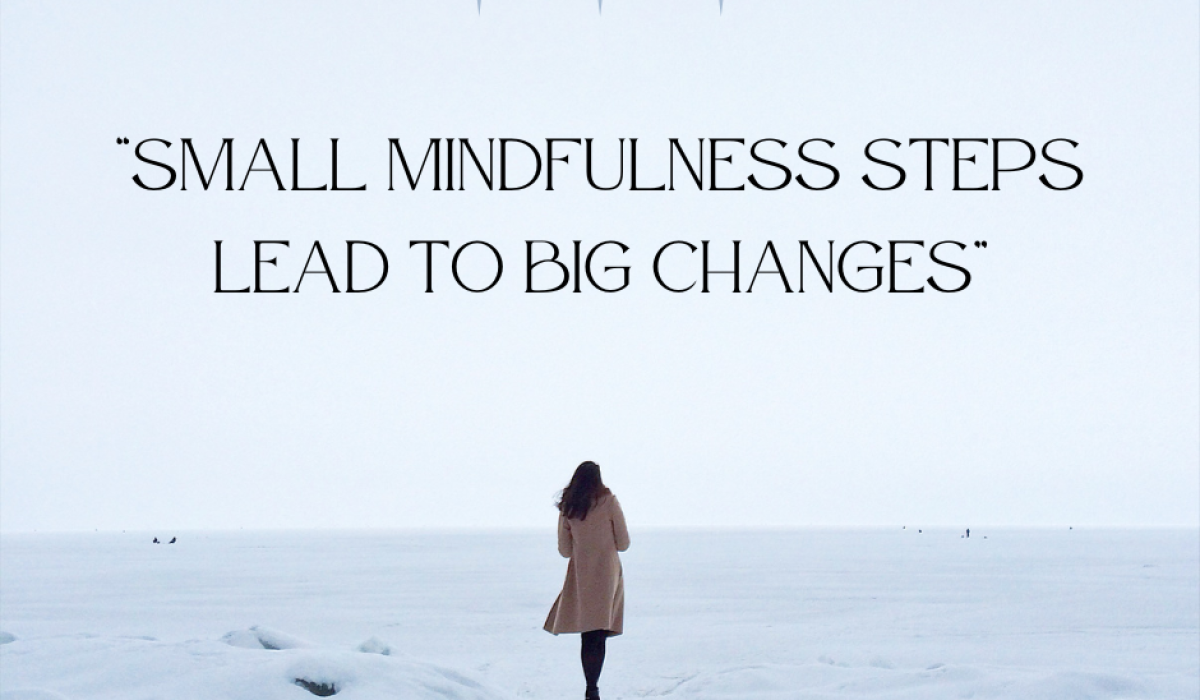Mindfulness can significantly improve everyday mental health by helping people stay present and manage stress more effectively. Here’s how:
- Reduces Stress: Mindfulness encourages focusing on the present moment rather than worrying about the future or dwelling on the past. By practicing mindfulness, individuals can calm their minds, reducing feelings of stress and anxiety. It helps break the cycle of overthinking, which can trigger stress responses.
- Increases Emotional Awareness: Mindfulness helps people become more aware of their emotions without judgment. By recognizing emotions as they arise, individuals can respond thoughtfully instead of reacting impulsively. This emotional awareness fosters better emotional regulation and improves relationships.
- Improves Focus and Attention: Mindfulness exercises like meditation or mindful breathing help improve concentration and mental clarity. Practicing mindfulness regularly can enhance attention span, reduce distractibility, and help individuals stay engaged in the present moment.
- Enhances Resilience: By cultivating a non-judgmental awareness of thoughts and feelings, mindfulness helps individuals bounce back from difficult situations more easily. It allows for a healthier perspective on challenges, fostering greater resilience in the face of adversity.
- Promotes Better Sleep: Mindfulness can also improve sleep quality by helping people relax and quiet their minds before bedtime. Mindfulness meditation, in particular, has been shown to reduce insomnia and enhance overall sleep by reducing mental chatter and anxiety.
- Reduces Symptoms of Anxiety and Depression: Mindfulness practices help people detach from negative thinking patterns associated with anxiety and depression. It encourages acceptance of thoughts and feelings without becoming overwhelmed by them. Research has shown that mindfulness-based therapies can be as effective as cognitive-behavioral therapy (CBT) for managing symptoms of anxiety and depression.
- Supports Overall Well-being: Regular mindfulness practice fosters a positive outlook on life by encouraging gratitude and self-compassion. It can lead to greater feelings of self-worth and happiness, making it easier to enjoy everyday life and foster a sense of peace.
Incorporating mindfulness into your daily routine doesn’t require a lot of time; even a few minutes of mindful breathing or a short meditation can have powerful benefits for mental health. Okay, so you ask, how do I practice this thing called mindfulness. Below are several ways to incorporate mindfulness and how you would do it.
Practicing mindfulness is all about being present and fully engaged in the moment, without judgment or distraction. Here are some simple ways to practice mindfulness:
1. Mindful Breathing
- How to do it: Sit or lie down in a comfortable position. Close your eyes, and focus your attention on your breath. Breathe slowly and deeply, noticing the sensation of air entering and leaving your body. If your mind starts to wander, gently bring your focus back to your breath.
- Why it helps: It calms the mind and brings you back to the present, helping reduce stress and anxiety.
2. Body Scan Meditation
- How to do it: Lie down or sit comfortably. Close your eyes and take a few deep breaths. Start by focusing on your toes, each toe individually, noticing the sensations, tension or discomfort without trying to change anything. Slowly move up your body, paying attention to each part—your feet, legs, hips, stomach, chest, arms, neck, and face. Continuing to notice the sensations.
- Why it helps: It increases awareness of bodily sensations and helps release physical tension, fostering relaxation.
3. Mindful Eating
- How to do it: Sit down and eat without distractions (e.g., no TV, phone, or computer). Focus on the colors, textures, smells, and tastes of your food. Chew slowly, noticing how it feels in your mouth. Pay attention to your body’s hunger cues and how the food nourishes you.
- Why it helps: It encourages a deeper connection with your food, promotes healthy eating habits, and reduces emotional or mindless eating.
4. Mindful Walking
- How to do it: Take a walk in a quiet place, preferably outdoors. Focus on each step, feeling your feet connecting with the ground. Notice the movement of your body, the sounds around you, the air on your skin, and the scenery. Stay present and avoid letting your mind wander to other thoughts.
- Why it helps: It allows you to practice mindfulness while moving, reducing stress and enhancing the connection between body and environment.
5. Mindful Observation
- How to do it: Choose an object to focus on—a flower, a painting, or even a simple everyday object like a chair. Observe it carefully, noticing every detail (color, texture, shape, etc.). Let go of any judgments or thoughts and just experience it as it is.
- Why it helps: This practice enhances attention and helps you appreciate the little things in life.
6. Mindful Listening
- How to do it: In conversations, try to listen fully without interrupting or planning your response. Focus on the speaker’s words, tone, and body language. Be fully present, and notice how the conversation makes you feel. Avoid judgment or distractions.
- Why it helps: It improves communication and strengthens relationships by fostering deeper connections.
7. Guided Meditation
- How to do it: Use apps like Headspace, Calm, YouTube or Insight Timer, which offer guided meditations. These are great for beginners and can help guide you through mindfulness exercises, such as focusing on your breath, visualizing peaceful imagery, or practicing body awareness.
- Why it helps: It provides structure and support, especially for those new to mindfulness.
8. Mindful Journaling
- How to do it: Set aside time to reflect on your day or your emotions. Write about your experiences and how you felt in the moment, without editing or overthinking. Let your thoughts flow freely without judgment.
- Why it helps: It encourages self-reflection, emotional processing, and increased self-awareness.
Tips for Success:
- Start small: Begin with just a few minutes each day and gradually increase the time as you become more comfortable.
- Be patient: Your mind will wander. When it does, gently bring it back to your practice without being hard on yourself.
- Consistency: Aim to practice daily, even if it’s just for a few minutes, to build mindfulness into your routine.
Mindfulness is a skill that deepens with regular practice, and over time, it can become a natural part of your daily life. It helps cultivate a sense of peace and balance that enhances overall mental well-being.



